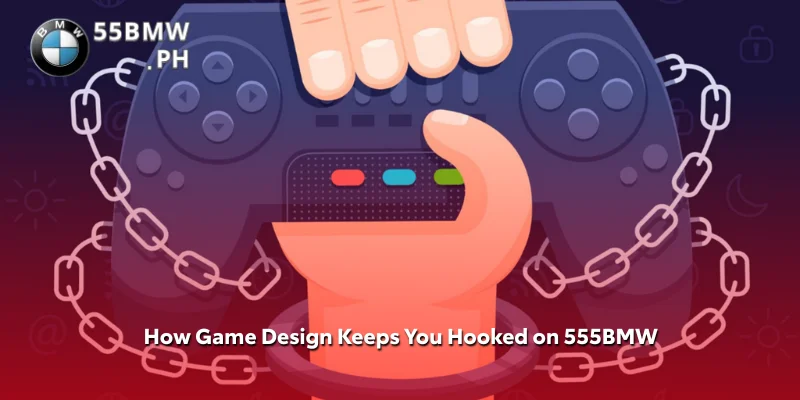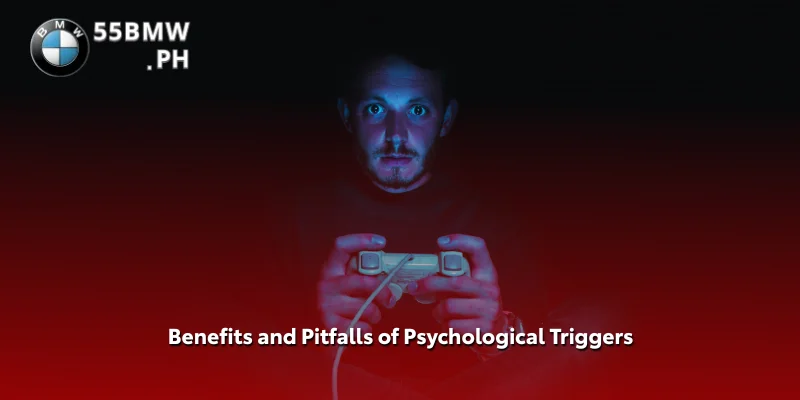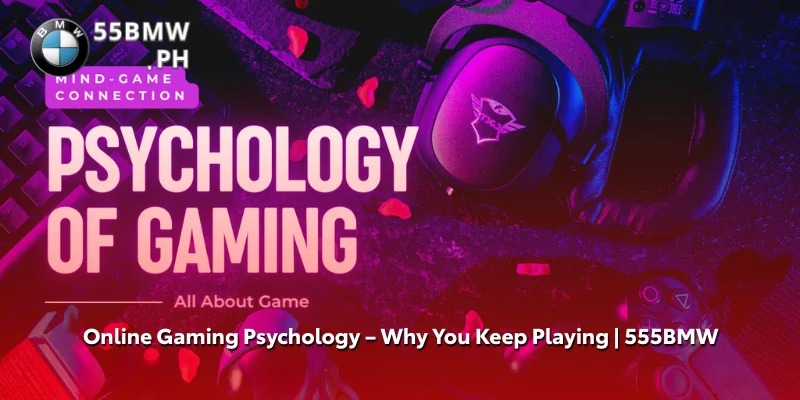Online Gaming Psychology looks at how players are influenced by digital games on an individual level. It focuses on issues such as players’ behavioral changes and their emotions. In the same vein, game developers use critical psychological principles to keep players engaged through dopamine-driven rewards or the fear of missing out. Aimed at creating immersive experiences, 555BMW and other similar platforms integrate these principles, but knowing the pitfalls is pivotal in upholding a healthy relationship with gaming.
The Core Psychology Behind Online Gaming Behavior
Every online game develops parts of a player’s brain because it is made to exploit the basic human thought process. It might be the joy a person experiences after winning or the anger a person feels after losing; these games are made to use psychological drawbacks and feelings to ensure players are always interested. In this article, we will analyze the basic parts of a person’s psychology that make gaming so addictive:
The Dopamine Loop – Rewards and Reinforcement
Dopamine is a part of the brain structure responsible for addiction to games. It is released every time a player wins something in the game or even levels up. This plays a crucial part in fuelling an addiction to games. And the same dopamine is released each time they level up or win something, associating gaming with pleasure.
~To maximize this effect, game developers use random value systems. Games often offer random items or bonuses that are unexpected, like the prizes from slot machines. This unpredictability makes it extremely difficult to put the games down.
~Players are encouraged to log in daily to access rewards like XP or daily bonuses, which seem small, but from a neurological standpoint, could qualify as wins. This will make them reliant on games as a source of validation, and deciding to stop is very complicated.
Loss Aversion & Near Misses – The “Almost Won” Trap
Loss aversion, a key concept in behavioral economics, describes the tendency for people to fear losses more than appreciate gains. This principle is often exploited in games by providing near-misses, such as wins and scores, that trigger a yearning to “win back” a pseudo-loss.
~Slot machines are notorious for showing two matching symbols and then an almost matching third; many players exclaim, “I was so close!”. In competitive games, narrowly losing a “victory” reinforces the belief that success is imminent, encouraging players to stay longer.
~The impact is staggering. Pursuit of perceived failure often manifests in that “one last game” mentality, regardless of overwhelming fatigue and growing irritation. Understanding this loop is vital for escaping it.
The Illusion of Control in Strategy-Based Games
Games like card games or MOBAs give the impression that solely skill can determine the outcome. While strategy is important, chance elements such as card draws or critical hits have a hefty influence on the outcome. Players tend to overestimate their skills, attributing wins to personal ability and losses to luck, which is known as self-serving bias.
~This is further supported by the self-esteem progression systems that mobile gaming or casual gaming has. In luck-based games, badges and levels granted are based on false mastery. Players feel they are improving when, in reality, the game seeks to keep them just proficient enough to grant dopamine hits, but never too competent enough to stop playing.
~The result? Players perpetually grind, thinking that the next game or level will solidify their falsely perceived mastery. This is particularly enticing in mobile games, which feature ranked modes that come with seasonal rewards, which intensify the urge to play.
How Game Design Keeps You Hooked on 555BMW
To maximize player engagement, game developers will often design with certain mental strategies in mind. Reward systems as well as sensory elements are also tuned to ensure that the experience is as appealing as possible. For example, 555BMW employs great design along with rewarding systems to make sure that players keep coming back.
Gamification Elements (XP, Levels, Rewards)
Gamification transforms dull activities into exciting tasks. Completing ZP, leveling up, and unlockable rewards create mini goals that can be achieved. Each goal strengthens the habit through milestones that trigger dopamine.
~Bizarrely, daily quests create a semblance of urgency while battle passes reward consistent gamers. Both encourage players to log in often to claim limited offers. This works particularly well with FOMO, or fear of missing out, when it comes to exclusive deals.
~Additionally, social aspects such as leaderboards and guild rankings tap into competition and encourage engagement. This helps players to gain not only individual, but also comparative achievements, which sustains engagement.
UI/UX Design That Encourages Longer Sessions
UI design shapes human interaction on a far greater scale than many people realize. Even video games try to reduce friction with their user interface by simplifying menus, auto-queuing matches, and providing single-click replay options. The simplification of queuing for a match is inversely proportional to stopping game play.
~Dark patterns of player inertia are also exploited by stealthy quit button suppression and logout option embedding. Some games reward additional rounds played with “just one more” rewards. These subtle prompts take advantage of decision fatigue and heavily encourage players to keep on playing.
~These strategies are brilliantly deployed by 555BMW. Borders to navigation are non-existent, and reloading is instantaneous, allowing users to effortlessly achieve maximum immersion and optimization, losing track of time.
Sound and Visual Stimuli That Influence Emotions
Aural and visual stimuli lift and lower your emotions and feelings. For example, sound effects and visuals associated with celebrations trigger joy. When sound effects and music are combined with red alerts, it intensifies emotions even more. Everything said and done creates and shapes emotions. Triumphs are made to feel glorious, and defeats are set to be urgent.
~ Casino players have been conditioned to respond to certain stimuli. The clinking of coins and jingling of slot machines is countered by celebratory sounds, welcoming the player to “win.” These trained players are conditioned throughout the game, and even calm music can lower tension while playing, promoting extended periods of play.
~ 555 BMW games are flawless examples of this type of sensory exploitation. Players are captivated emotionally with the use of vivid imagery paired with captivating graphics and soundtracks.
How to Register and Enjoy Games Responsibly at 555BMW
Even though gaming fosters entertainment and community, Balance is key. 555BMW advocates for responsible gaming by offering easy access paired with habit management tools. In this article, we show you how to enjoy gaming while avoiding unhealthy habits.

Fast Sign-up Process with Secure Verification
555BMW prioritizes easy sign-up for users. An efficient sign-up procedure enables players to quickly access the game, and strong verification checks keep accounts secure. This approach balances no sign-up hurdles with active fraud safeguards.
Some of the important characteristics are:
- ~Social media login 555BMW allows users to log in with one click.
- ~Two-step verification processes for extra safety measures.
- ~Age checks for encouragement of more responsible uses.
With 555BMW, users can enjoy the game without unnecessary safety concerns while streamlining onboarding.
Tips for Time Management While Playing
Gaming can easily consume an entire day. To avoid burning out:
- Use phone alarms or in-game reminders to set timers for sessions.
- Remember to take breaks every 60–90 minutes to stretch and do eye exercises.
- Make sure to take care of real-life responsibilities before engaging in extended gaming sessions.
555BMW promotes healthy habits by providing tools that track playtime. Players can track and limit their usage, allowing them to enjoy gaming instead of feeling like they have to do it.
Benefits and Pitfalls of Psychological Triggers
Game psychology isn’t good or bad; it depends on how players and platforms manage it. Recognizing these triggers helps mitigate risks while harnessing their benefits.

Positive Impact – Entertainment & Stress Relief
Games help us escape our daily lives, express ourselves creatively, and connect with others. They offer a way to manage stress and provide an opportunity to spend time with close friends. Achievements in games offer a rush of dopamine that can help lift one’s spirits. Playing together in a game also builds collaboration and communication skills.
~Overall, gaming makes life better, so long as it’s done positively. Just like anything else, the secret lies in moderation, using games as a way to unwind instead of relying on them to avoid facing real-world problems.
Negative Risks – Addiction & Loss of Control
Spending too much time gaming can lead to:
- Losing out on sleep due to long play hours.
- Ignoring obligations such as work, school, or even being social.
- Financial loss in the case of games with microtransactions.
Being wise enough to identify the signs, which include irritability when not playing and reduced participation in real-world activities, is very important. Platforms such as 555BMW offer resources for those dealing with issues related to self-awareness.
FAQs – Can gaming become psychologically harmful?
If left uncontrolled. Gaming disorder (acknowledged by WHO) involves loss of control over gaming, preoccupation with gaming over other hobbies, and pursuing it even when facing adverse impacts. That said, the players, in the majority, experience gaming in a healthy manner, and moderation with mindfulness is important.
Why Filipino Gamers Often Fall Into This “One More Game” Loop
The gaming culture in the Philippines is full of life, but some factors make players especially prone to developing compulsive gaming habits.
Cultural Habits and Social Gaming Trends in the PH
Filipinos tend to be sociable gamers. Multiplayer games such as Dota 2 or Mobile Legends flourish because they support sociability. However, social pressure, for example, friends saying “one more match”- can prolong gaming beyond reasonable limits.
Mobile Gaming Accessibility and Peer Pressure
Considering that smartphones are inexpensive and the internet is easily accessible, mobile gaming has become even more popular. Because games and the devices that run them are widely available, the line between entertainment and addiction becomes less distinct. This is further fueled by social media, where users share and compete for milestones and rank.
Conclusion
Video games utilize true psychological principles to maintain player interest. Systems like 555BMW ensure responsible gameplay, allowing for safe enjoyment of the adrenaline rush. With the right understanding of dopamine loops, loss aversion, and clever design, gamers can take back control and play more consciously.

